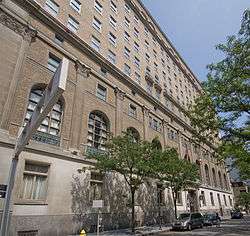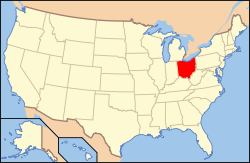Phoenix Building/Cincinnati Club
The Phoenix Building and Cincinnati Club are two historic buildings in downtown Cincinnati, Ohio, United States. The membership of these two clubs was chiefly Jewish.[2]
Phoenix Building/Cincinnati Club | |
 | |
  | |
| Location | 30 Garfield Pl. and 812 Race St., Cincinnati, Ohio |
|---|---|
| Coordinates | 39°6′16.16″N 84°30′53.36″W |
| Built | 1924 |
| Architect | Garber & Woodward and Samuel Hannaford & Sons [1] |
| Architectural style | Late 19th and 20th Century Revivals and Other[1] |
| NRHP reference No. | 85000068[1] |
| Added to NRHP | January 11, 1985[1] |
Located at 812 Race Street, the Phoenix Building was constructed in 1893 as a Jewish Businessman's organization designed by prominent Cincinnati architect Samuel Hannaford, the same architect who designed Cincinnati's Music Hall.[3] It was listed in the National Register on January 11, 1985,[1] and it is also recognized as a historic landmark by the Miami Historical Preservation Association. It was built in the architectural style of the Italian Renaissance, featuring Tiffany Glass windows and purchased by the neighboring Cincinnati Club, located at 30 Garfield Place, in 1911. The Cincinnati Club later sold the building in 1983.[4] It later became a fine dining restaurant 1988–2008, and continues as a private banquet facility.
The Cincinnati Club operated as a hotel and private businessman's club was also built by Garber and Woodward, Frederick W. Garber's firm.
The two properties are separate buildings and each are currently used as a banquet hall for private events.
Phoenix Club
The Phoenix Club was established as a "German Organization of Jewish Men," and the by-laws provided that all proceedings, records and entertainments be in the German language.[5]
A 1909 report of The Cincinnati Industrial Magazine states "The Phoenix Club is the leading Jewish social organization of the city, but movement of wealthy families to the outlying districts made the maintenance of the clubhouse too great an expense. The property was sold for $185,000 and will be remodeled into a theater, with restaurant and roof garden."[6]
Notes
- "National Register Information System". National Register of Historic Places. National Park Service. June 30, 2007.
- Clarke, S. J. (1912). Cincinnati, the Queen City, 1788-1912, Volume 2. The S. J. Clarke Publishing Company. p. 518. Retrieved 2013-05-20.
- "Society for the Preservation of Music Hall".
- "History of the Phoenix".
- Clark, S. J. (1912). Cincinnati, the Queen City, 1788-1912, Volume 2. The S. J. Clarke Publishing Company. p. 43. Retrieved 2013-05-20.
- Industrial Bureau of Cincinnati (1909). The Cincinnati Industrial Magazine, Volumes 1-2. p. 80. Retrieved 2013-05-20.

